When Will Solid State Batteries Be Available?
Solid State Batteries Be Available
The question “when will solid state batteries be available?” has become a popular one, as companies are trying to improve battery performance. While many have doubts about the technology, others believe that the technology will revolutionize the automotive industry. Ford, the world’s largest car manufacturer, has announced its intention to build a $185 million laboratory dedicated to the development of solid state batteries. The company also plans to use its batteries in their own cars.
Still, the company is not far from the finished product. The company is developing a battery that is better suited for the automotive industry. While solid state batteries are more stable than their liquid counterparts, they are still in the development stage. This means that they have to be refined and adapted to existing manufacturing processes. This process will require a higher cost, but it will also mean faster charging and reduced safety equipment.
Manganese Market Analysis by Martin Kepman CEO of Manganese X Energy Corp
The current cost of solid state batteries is a major issue. At the current price, they may not be affordable to most people. They will likely cost a lot more than their conventional lithium-ion counterparts, and that might prevent them from catching on. The low cost of solid-state batteries will encourage consumers to try them out, so they’ll be more competitive than their liquid-filled counterparts. And a solid-state battery can also be more efficient.

When Will Solid State Batteries Be Available?
While solid state batteries may not be available yet, they are in the development stages. It will be 10 years before they’re ready for mass production. Until then, however, hydrogen fuel cells will be a novelty, and only be used in SUVs and trucks. That means that the cost of solid-state batteries is too high for many consumers. Therefore, the question of “when will solid-state batteries be available?” should be answered before that happens.
Eventually, the solid-state battery will replace the liquid electrolyte in an EV. The battery will be able to provide a higher energy density. The battery will be much cheaper than the other batteries. It is also more durable and will last longer. The only real drawback is that the solid-state batteries will not explode. The company has yet to prove that the technology is viable. It is unlikely to reach a mass market this decade, but it is important to keep an eye on the latest developments and predictions.
While solid-state batteries are not new, they are not yet widely available. They have already been used in RFID for several years and have high expectations. They are smaller than liquids and can deliver up to ten times the energy density of lithium-ion batteries. They don’t require cooling systems and monitor their capacity. They also have no combustible components, so they’re more reliable and safe to use.